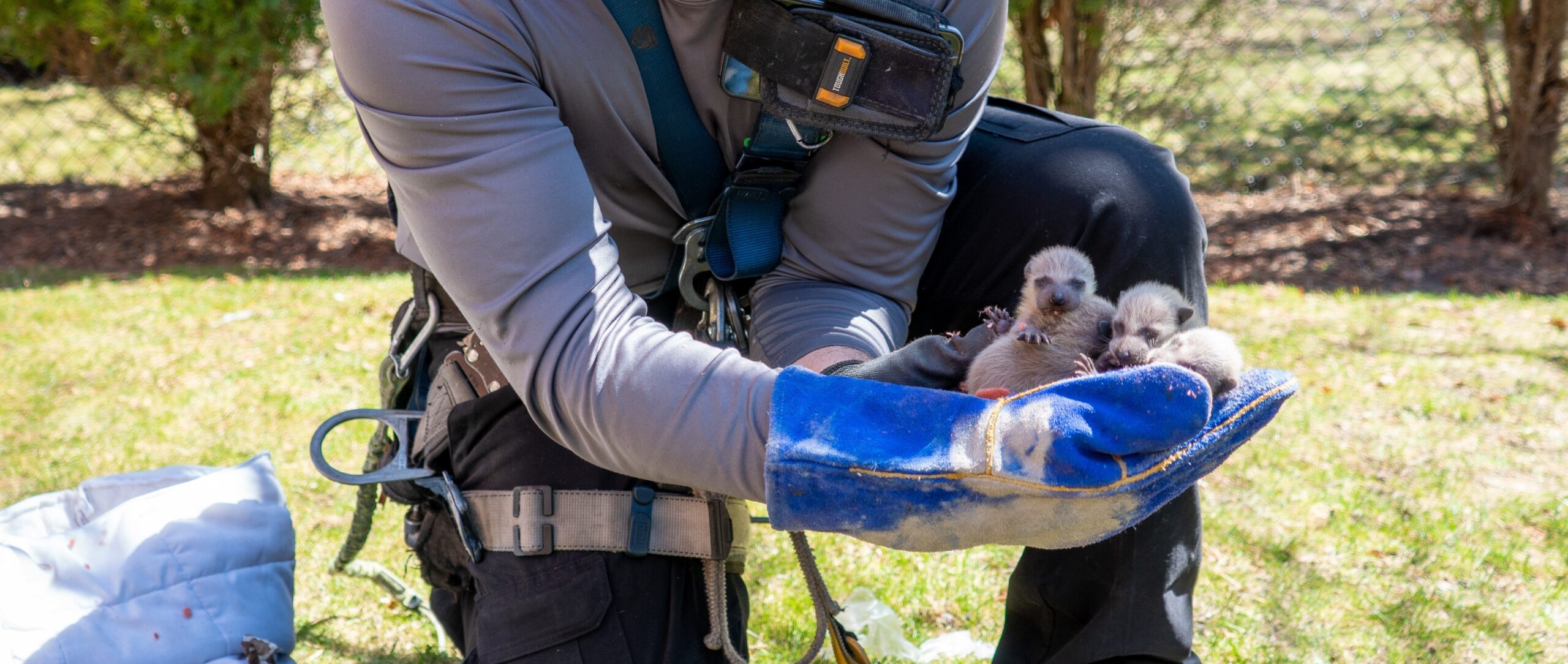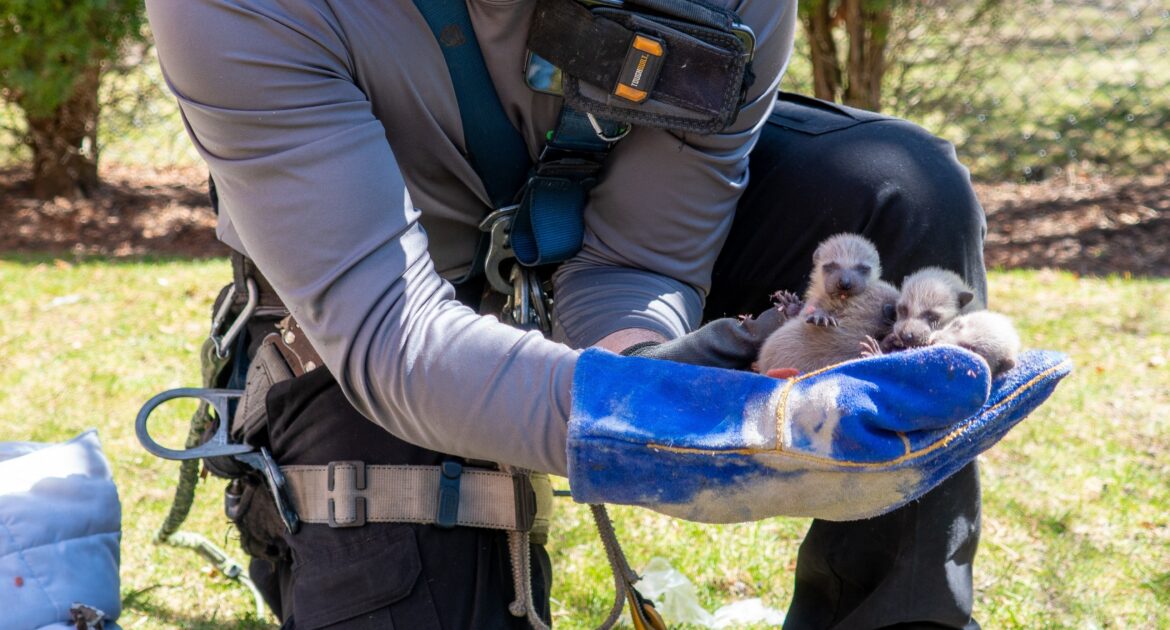Every year, homeowners face uninvited house guests—not neighbours or relatives, but wildlife seeking warm, safe spaces to raise their young. Raccoons, squirrels, mice, and bats are among the most common culprits looking to turn attics, walls, and crawl spaces into their nurseries during baby season. While baby animals can be adorable, the damage they cause and the challenges of humane removal make early intervention critical.
This blog will explain why wildlife prevention before baby season matters, how it helps protect your Niagara home, and what steps you can take to ensure your property remains wildlife-free, humanely and sustainably.
The Risks of Wildlife in Your Home During Baby Season
Wildlife prevention before baby season is crucial and addresses two major concerns:
Damage to Your Property
- Wildlife such as raccoons, squirrels, and birds can cause significant damage when trying to access spaces like attics, roofs, or vents to create their homes. They can tear through roofing materials, shred insulation, and create nests in ventilation systems.
- Mice and rats often leave droppings that contaminate surfaces, spreading diseases and creating unsanitary conditions.
- Bats, on the other hand, can produce large amounts of guano (bat droppings), which not only creates a serious odour but can also cause structural damage to wood, drywall, and ceilings.
During baby season, the risk of damage increases dramatically, as mothers become highly motivated to secure a safe nesting space for their young. They will often chew through barriers, force their way into small openings, or cause further destruction while relocating their babies to a perceived safer spot.
Challenges of Humane Removal
Once baby wildlife is present, the process of humane removal becomes much more complicated. Mothers are fiercely protective and will do everything in their power to return to the den if separated from their young, even if access points are sealed off. This often results in increased stress for the animals and additional damage to your property as they attempt to break back in.
Additionally, separating a litter from its mother can lead to inhumane outcomes, such as abandoned or starved babies. These situations are not only heartbreaking but can also create new problems, such as rotting carcasses that attract pests or produce foul odours.
By addressing wildlife prevention early, before baby season, you can avoid the headaches and heartache that come with these risks. Sealing entry points, performing regular property inspections, and working with humane wildlife specialists can save you time, money, and stress. Early prevention isn’t just proactive; it’s also kinder to the animals and ensures a safer, healthier environment for your home.
Signs Wildlife is Eyeing Your Home for Baby Season
Wild animals are incredibly resourceful and will exploit any weak point in your home to sneak in, looking for shelter and a safe place to start nesting. From loose roof shingles to small gaps in your foundation, even the tiniest openings can become an entry point. Once inside, they can cause significant damage to your property and even pose health risks. Be sure to look out for these warning signs to catch any potential intruders early.
- Strange Noises: Scratching, chirping, or squeaking sounds coming from your attic, walls, or crawl spaces could indicate animals are already inside.
- Exterior Damage: Broken shingles, holes in roofing, bent vents, or gnawed wires can signal entry points.
- Droppings: Mice or bat droppings in attics or near walls are telltale signs of recent activity.
- Tracks and Smells: Smudges, footprints, or musky odours near entry points or spaces could indicate wildlife presence.
Catching these signs early allows for prevention measures that avoid unnecessary damage or costly repairs later.
Why Prevention Timing Matters
Wildlife baby season typically begins in late winter or early spring, depending on the species. This is when animals are most active in finding safe, warm spaces to give birth. By acting before this timeframe, you effectively block their access to nesting areas in your home.
Key Species and Their Timing
- Raccoons: Raccoons give birth between March and June. They often tear into attics or chimneys to create dens, leading to costly damage.
- Squirrels: Squirrels have two nesting periods, one in late winter and another in early summer, making them particularly persistent during baby season.
- Mice: Mice reproduce year-round but become more active indoors during colder months, increasing the likelihood of infestations.
- Bats: Maternity roosts for bats begin forming in spring. If bats settle inside your attic, their guano can accumulate rapidly.
Preemptively addressing these species’ behaviours ensures your home isn’t on their maternity ward list. Our Skedaddle technicians are specially trained to handle situations involving a mother and her babies with care and expertise.
Using our proven humane removal process, we ensure the safe relocation of the animals while protecting your home and family. By carefully assessing the situation, securing entry points, and providing solutions that prioritize animal welfare, we guarantee a safe and effective outcome for both you and the wildlife.
The Value of Humane Wildlife Prevention
At Skedaddle Humane Wildlife Control, our mission is to create harmony between humans and wildlife by providing safe, effective, and humane solutions to wildlife issues. We understand that wildlife can sometimes find its way into homes or properties, creating challenges for both homeowners and the animals themselves.
That’s why we’ve crafted a humane approach that prioritizes the well-being of both parties, ensuring animals are treated with care while safeguarding your home from future invasions.
The Skedaddle Approach: Humane Wildlife Control Done Right
Here’s how we stand out:
Comprehensive Inspections
Our process starts with a thorough inspection of your property. We don’t just look for the obvious signs of wildlife activity—we dig deeper to locate all potential entry points, hidden nests, and structural vulnerabilities. Whether it’s a raccoon in your attic, squirrels in your walls, or bats in your chimney, we investigate every nook and cranny to ensure nothing is overlooked.
Gentle Wildlife Removal
Once we identify the issue, our highly trained team uses humane methods to remove wildlife safely and responsibly. For example, we use one-way doors that allow animals to exit your home but prevent them from re-entering. If we find baby animals, we use specialized baby boxes to reunite mothers with their young outside. This ensures the entire family is relocated without harm or separation.
Permanent Wildlife-Proofing Solutions
After removing the animals, we don’t just leave you with a temporary fix. Our team takes proactive measures to prevent future infestations. We seal all potential entry points with durable materials designed to stand the test of time. Additionally, we decontaminate affected areas to eliminate odours, bacteria, and parasites left behind by wildlife, restoring your home to a clean and safe environment.
Why Choose Skedaddle?
Choosing Skedaddle Humane Wildlife Control means choosing a company that values coexistence. We recognize that wildlife plays a crucial role in the ecosystem, and our goal is to resolve conflicts in a way that respects their place in nature while protecting your property. With decades of experience and a commitment to humane practices, we’ve helped thousands of homeowners across North America regain peace of mind.
By opting for humane wildlife control, you’re not only safeguarding your home but also supporting a compassionate approach that promotes coexistence with local wildlife. At Skedaddle, we’re proud to be your trusted partner in making your home wildlife-free, the humane way.
Taking Action Before Baby Season Arrives
Preventing wildlife intrusions before baby season saves you time, money, and worry while ensuring animal families remain safe. Whether it’s raccoons in the attic, squirrels in the walls, or bats in the eaves, proactive measures (like sealing entry points and using humane deterrents) are the best line of defence.
If you’re seeing signs of wildlife activity in or around your home, don’t wait for the problem to escalate. Contact Skedaddle Humane Wildlife Control in Niagara today for expert assistance tailored to your needs. Through early prevention and humane control, we can help you keep your property safe, comfortable, and wildlife-free.




